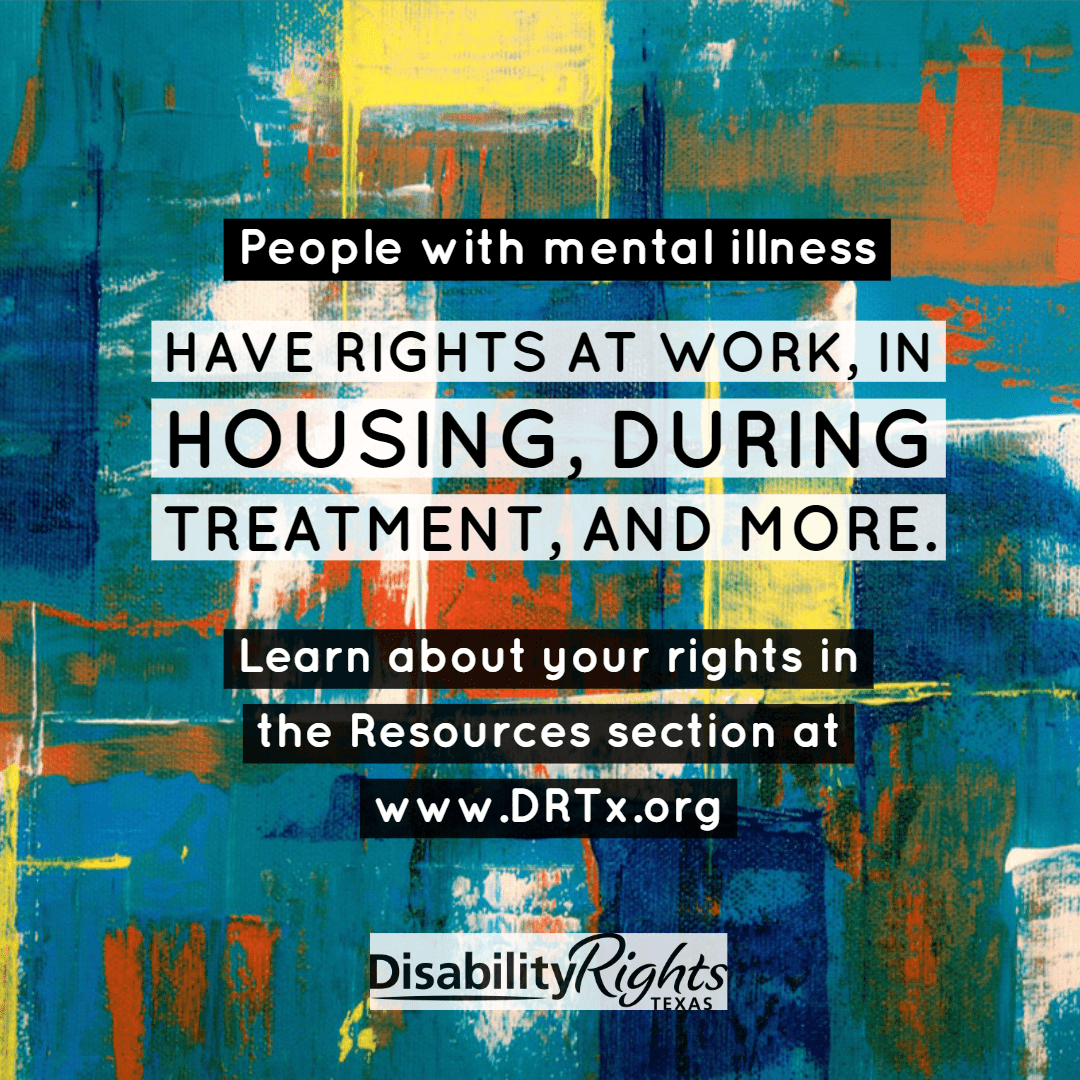With May being National Mental Health Awareness Month, we’d like to take this opportunity to tell you about the work we do at Disability Rights Texas (DRTx) to protect and advocate for people with mental illness.
DRTx is a protection and advocacy agency for people with disabilities. A federal law passed in 1977 said that every state must have an agency like ours that provides legal services to people with disabilities who are facing abuse, neglect, and discrimination. It’s called the protection and advocacy (P&A) system.
 In 1986, Congress passed a law specifically about protecting and advocating for the rights of people with mental illness by creating a special program within each P&A state agency. It’s called the Protection and Advocacy for Individuals with Mental Illness (PAIMI) program and is grant funded by the U.S. Department of Health and Human Services (HHS) Substance Abuse and Mental Health Services Administration (SAMHSA).
In 1986, Congress passed a law specifically about protecting and advocating for the rights of people with mental illness by creating a special program within each P&A state agency. It’s called the Protection and Advocacy for Individuals with Mental Illness (PAIMI) program and is grant funded by the U.S. Department of Health and Human Services (HHS) Substance Abuse and Mental Health Services Administration (SAMHSA).
The federal PAIMI Act includes the requirement for an advisory council that offers guidance on DRTx on policies and priorities to be carried out in protecting and advocating for the rights of mentally ill individuals. Our PAIMI Advisory Council includes people with mental illness, family members and mental health professionals.
The PAIMI program was originally established to provide protection and advocacy services to individuals with significant mental illness or emotional impairment who were or had recently resided in institutional settings. In 2000, Congress expanded the PAIMI program to individuals living in both institutional and community settings, including their own homes.
Under the PAIMI program, P&As like Disability Rights Texas are authorized to investigate abuse and neglect and rights violations in all public and private facilities and community settings, including hospitals, nursing facilities and group homes – and to oversee the effectiveness of state agencies that license and regulate these programs.
Our PAIMI program staff also play a critical role in ensuring that people with mental illness have access to education, housing, employment and other necessary supports and services in the community so they can remain in their communities and be economically self-sufficient. In addition, program staff work to reduce discrimination in employment and housing.
Additionally, PAIMI program staff play an increasingly critical role in juvenile justice and adult correctional facilities where people with mental illness, who are not receiving the supports and services they need in the community, often end up incarcerated.
The United States Department of Health and Human Services has also mandated that the P&A system receive investigation reports of deaths and serious injuries related to restraint and seclusion practices in hospitals and psychiatric facilities.
Finally, in 2002 and 2003, Congress affirmed that the P&A system has a significant role in addressing the community integration needs of individuals with mental illness.
So during the next few weeks during this awareness month, be watching for our posts on our Facebook, Twitter, and Instagram pages as we dispel several myths about mental illness including the inaccurate links to violence that we hear about, and we provide information on your rights when receiving treatment in certain settings.
For information about your rights, check out the following resources:
- Rights of People Receiving Involuntary Inpatient Mental Health Services
- Restraint and Seclusion Guidelines: Rights of People Receiving Behavioral Interventions
- Employment Advice for People with Mental Illness Disabilities
- Your Legal Rights Under Emergency Commitment
- Voluntary Patient Rights
- Inpatient Discharge Rights
See our Institutional Rights and Civil Liberties Resource Page for additional information.
